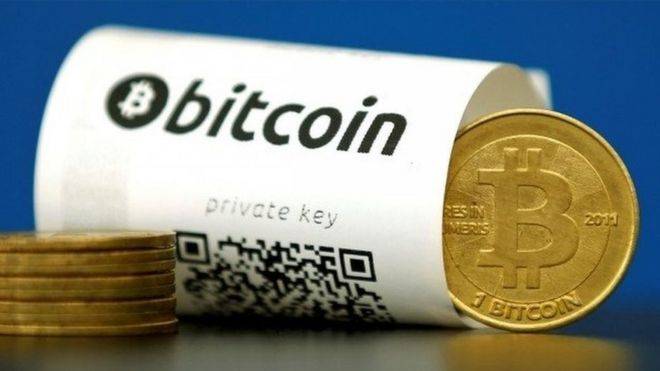illustratum
Rookie
- Dec 7, 2015
- 2
- 0
- 1
since the currencies (for the most part) aren't centralized, they are kind of hard to tax
Follow along with the video below to see how to install our site as a web app on your home screen.
Note: This feature may not be available in some browsers.
His admission follows years of speculation about who came up with the original ideas underlying the digital cash system. Mr Wright has provided technical proof to back up his claim using coins known to be owned by Bitcoin's creator. Prominent members of the Bitcoin community and its core development team say they have confirmed his claims. But many others in the Bitcoin world are asking for more proof.
Signed blocks
Mr Wright has revealed his identity to three media organisations - the BBC, the Economist and GQ. At the meeting with the BBC, Mr Wright digitally signed messages using cryptographic keys created during the early days of Bitcoin's development. The keys are inextricably linked to blocks of bitcoins known to have been created or "mined" by Satoshi Nakamoto. "These are the blocks used to send 10 bitcoins to Hal Finney in January [2009] as the first bitcoin transaction," said Mr Wright during his demonstration. Renowned cryptographer Hal Finney was one of the engineers who helped turn Mr Wright's ideas into the Bitcoin protocol, he said. "I was the main part of it, but other people helped me," he said.
Soon after Mr Wright went public, Gavin Andresen, chief scientist at the Bitcoin Foundation, published a blog backing his claim. "I believe Craig Steven Wright is the person who invented Bitcoin," he wrote. Jon Matonis, an economist and one of the founding directors of the Bitcoin Foundation, said he was convinced that Mr Wright was who he claimed to be. "During the London proof sessions, I had the opportunity to review the relevant data along three distinct lines: cryptographic, social, and technical," he said. "It is my firm belief that Craig Wright satisfies all three categories."
Mr Wright said he planned to release information that would allow others to cryptographically verify that he is Satoshi Nakamoto. Not everyone has been convinced by Mr Wright's claims and the technical proof he put in his blog. Some cryptographers and developers who worked through the information provided said they had trouble getting verifiable information out of it. Security expert Dan Kaminsky said the procedure was almost "maliciously resistant" to validation. Many people have called on Mr Wright to go further in proving his identify.
How Bitcoin works
BBC News said Monday that Craig Wright told the media outlet he is the man previously known by the pseudonym Satoshi Nakamoto. The computer scientist, inventor and academic said he launched the currency in 2009 with the help of others. Wright made similar claims to the Economist magazine, which said on its website it still has "nagging" questions about Wright's claim. He also asserted his role in a lengthy blog post. The founder's identity has been shrouded in uncertainty, and the media's inability to pinpoint the person responsible has led to a series of investigations. Last year, some reports claimed Wright was the founder and had used a false name to mask his identity.
Wright told the BBC he had decided to make his identity known to stop the spread of "misinformation" about Bitcoin. "I didn't take the decision lightly to make my identity public and I want to be clear that I'm doing this because I care so passionately about my work and also to dispel any negative myths and fears," he said. Wright said he believes that Bitcoin and blockchain, the technical innovation that makes the currency possible, "can change the world for the better." He added that he would now be able to release his research and academic work to help people understand the potential of Bitcoin. Bitcoin is designed for secure financial transactions that require no central authority - no banks, no government regulators. That makes it attractive to off-the-grid types such as libertarians, people who want to evade tax authorities, and criminals, even though Bitcoin doesn't guarantee anonymity, since it documents every transaction in a public forum.
According to the BBC, Wright supported his claim to being the founder by signing digital messages using cryptographic keys used during the early days of Bitcoin. If Wright is the founder, he is likely a very wealthy person. The person going by the pseudonym Nakamoto is believed to have amassed about 1 million Bitcoins, which would be worth about $450 million if converted to cash, the BBC says. Jon Matonis, one of the founding directors of the Bitcoin Foundation, which says it helps support the use of the currency, told the BBC he is convinced that Wright is who he claims to be and is responsible for a brilliant achievement.
The hunt for Bitcoin's founder had become a mission for some journalists. Attention focused for a time on a Finnish sociologist, a Japanese math whiz and a Japanese-American engineer. In December, the technology magazine Wired and the website Gizmodo both published lengthy investigations based on documents and emails that concluded Wright was probably the man behind the pseudonym. He was living in an upscale suburb of Sydney at the time. The reports were circumstantial and contained no proof. But Wright's new statements, and his use of Nakamoto's own encrypted signature, known as a PGP key, may have confirmed his role. He also spoke to GQ magazine and the London Review of Books.
News from The Associated Press
Bitcoin soared in value last year, becoming 2016’s strongest performing currency, with the digital currency’s dizzying rise continuing over into the new year. The Bitcoin Price Index showed the currency breaking through the US$1,100 mark during early trading Wednesday, reaching a three-year high of US$1,139.89 and edging toward 2013’s record high of US$1,165.89.

A collection of bitcoin tokens are pictured in London last week on Wednesday
However, according to Reuters, Bitcoin’s value suddenly plummeted on Thursday by 20 percent, slumping to US$885.41, a fall of more than US$200 in a single day’s trading, once again demonstrating the volatile nature of digital currencies. Reports attributed the cause of the dramatic crash to the Chinese yuan offshore exchange rate’s steep appreciation of more than 1 percent against the dollar.
Bitcoin plunges 20 percent<br /> 比特幣暴跌百分之二十 - Taipei Times
A unit of the digital cryptocurrency Bitcoin has exceeded the value of an ounce of gold for the first time. It closed at $1,268 on Thursday while a troy ounce of gold stood at $1,233. The current high is being attributed to surging demand in China, where authorities warn it is used to channel money out of the country. The past months' surge is a major reversal for Bitcoin, which plummeted in value in 2014 after the largest exchange collapsed.

Bitcoins
The value of Bitcoin has been volatile since it was first launched in 2009, and many experts have questioned whether the crypto-currency will last. Earlier this year, Chinese authorities cracked down on Bitcoin trading in an attempt to stop money flowing out of the country illegally. But the closer scrutiny from Beijing only briefly sent the currency lower. After it had soared to record highs in January, it has since picked its steady rise in value.
How Bitcoin works
Bitcoin is often referred to as a new kind of currency. Yet like all currencies its value is determined by how much people are willing to exchange it for. To process Bitcoin transactions, a procedure called "mining" must take place, which involves a computer solving a difficult mathematical problem with a 64-digit solution. For each problem solved, one block of Bitcoins is processed. In addition the miner is rewarded with new Bitcoins. To compensate for the growing power of computer chips, the difficulty of the puzzles is adjusted to ensure a steady stream of new Bitcoins are produced each day.

Verifying bitcoin transactions takes a lot of computer power
There are currently about 15 million Bitcoins in existence. To receive a Bitcoin, a user must have a Bitcoin address - a string of 27-34 letters and numbers - which acts as a kind of virtual post-box to and from which the Bitcoins are sent. Since there is no register of these addresses, people can use them to protect their anonymity when making a transaction. These addresses are in turn stored in Bitcoin wallets, which are used to manage savings.
Bitcoin value tops gold for first time - BBC News